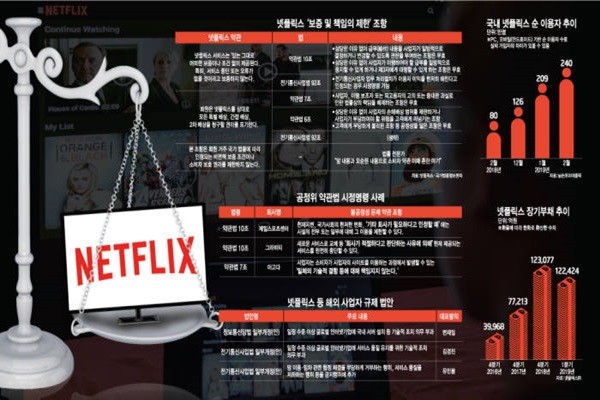Netflix is currently at the center of currency for stating within its terms and conditions that it is not responsible for maintenance and quality of its service and inducing its customers to give up on demanding compensation.
Although it is a paid service, it will be difficult for Netflix to avoid criticisms for avoiding any responsibility on liabilities through an escape clause.
There are also criticisms towards Netflix that ultimately dump any responsibility for poor quality of its service stemming from increased members onto ISPs (Internet Service Provider).
◊High possibility of Netflix’s terms and conditions violating
After analyzing ‘limitation on guarantee and responsibility’ of Netflix’s terms and conditions, its terms and conditions include information that violates Article 6, 7, and 10 of Standardized Contracts Act.
According to Netflix’s terms and conditions, its service is provided as it is without any guarantee or condition and there is no guarantee that its service is provided without any error or stoppage.
There is a possibility that its terms and conditions violate Article 10 because Netflix can change information on its own depending on internal decisions and stop its service according to arbitrary decisions.
Actually, Fair Trade Commission (FTC) gave corrective orders to Jeil Sports Center and Gravity in 2007 for similar situation.
There is a high chance that Netflix’s terms and conditions that force its members to give up their rights to demand every special compensation, indirect compensation, and secondary compensation will be invalid according to Article 6 and 7 because these terms and conditions unfairly eliminate and limit any responsibility without considering any intention or mistake.
Although Netflix added that it does not limit consumer protection right or non-escape guarantee condition that is acknowledged depending on laws of a certain country, it contradicts itself for stating that it categorically excludes any service guarantee or liability of compensation.
“It can be seen that Netflix confuse its users with its terms and conditions confuse its users by writing terms and conditions with logical contradiction.” said a legal expert. “FTC can give a corrective recommendation to Netflix asking Netflix to clarify its terms and conditions.”

◊Netflix passes on blame to internet service providers
Fact that Netflix stated that it does have any responsibility related to maintenance and quality of its service collides with ‘transmission quality responsibility’ issue that is important especially for video service providers.
This is because transmission quality is directly related to quality within OTT (Over The Top) service that is provides through wired and wireless internet.
When quality becomes poorer or there is disconnection due to reduced internet transmission quality, a blame can be passed onto ISP according to Netflix’s terms and conditions.
Netflix also does not hold any responsibility for inconvenience that can arise from increased members or sudden temporary increase in number of users. It does not need to work with ISPs to improve quality of its service as it is not responsible according to its terms and conditions.
There is a growing number of angry Netflix users in South Korea towards quality of Netflix’s service as number of Netflix users in South Korea surpassed 2 million this year.
However, Netflix is passing on any blame for poor quality of service to ISPs.
A solution is to negotiate with Netflix regarding a cost of using network including cache servers. Netflix once signed contracts for cost of using network when ISPs such as Comcast and Orange raised an issue regarding excessive traffic.
Reason why Netflix is hesitant on negotiating a cost of using network is financial burden it can face in the future. Amount of burden for investments into contents has increased as Disney, Apple, and WarnerMedia jumped into OTT market. As a result, Netflix needs to minimize any cost such as cost of using network.
Amount of long-term debt of Netflix at the end of the first quarter of 2019 was $10.3 billion that is 58.5% more than amount of its long-term debt at the end of 2017. It issued $2 billion bonds in April to invest into contents.
◊Netflix needs to improve its unfair terms and conditions
Netflix’s unfair terms and conditions can be fixed by applying South Korean laws.
Previously, Netflix changed applicable law from ‘Netherland law’ to ‘South Korean law’ when it was revising its terms and conditions. By doing so, regulatory agencies can enforce corrective orders to Netflix.
“It is possible to apply South Korean laws as Netflix changed applicable law while it was revising its terms and conditions.” said a legal expert.
FTC, Ministry of Science and ICT, and Korea Communications Commission can levy corrective orders to Netflix for its unfair terms and conditions according to Standardized Contracts Act and Telecommunications Business Act.
Telecommunications Business Act has corrective orders given to a telecommunications business if it is seen that its business processing procedure clearly disrupts benefits of users.
Staff Reporter Park, Jinhyung | jin@etnews.com & Staff Reporter Kim, Yongjoo | kyj@etnews.com